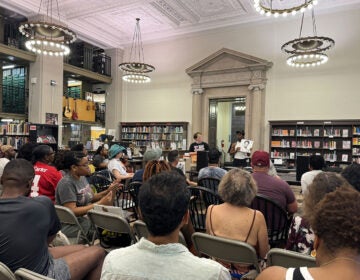NextMove Dance, Ghosts Are Jealous, Metropolis Farms
NextMove Dance
Producer: Karen Smyles
NextMove is Philadelphia’s premiere forum for the best that dance has to offer. Founded in 1979 by Artistic Director Randy Swartz as the American Ballet Competition to support American dancers competing in international dance competitions, the organization legally changed its name in 2005 to Dance Affiliates to more appropriately reflect its mission and programming to promote, support and present dance since 1983. Its annual Dance Celebration series was renowned for 32 years. In October 2015, the organization opened the inaugural season of its new dance series called NextMove, Dance at the Prince, in Center City Philadelphia, offering more performances and outreach activities through extended engagements and residencies to reach more diverse audiences and give the series the potential to become a powerful player on the city’s cultural landscape with its location within the scope of the Avenue of the Arts. With its second season launch in the fall of 2016, the organization’s name will officially change to NextMove Dance (NMD).
NMD serves its mission through a commitment to artistic excellence in the presentation of diverse dance styles and choreography, cultures and nationalities; commission of original works from local and nationally-known choreographers; cultivation of broadly-based adult and youth audiences; enrichment of the school curriculum through high-quality performance, arts education, and outreach programs; collaborations with performing arts partners in the field; service to the local dance community; and active participation in the vibrant Philadelphia arts community. NMD’s greatest strength is that it has endured and thrived for more than three decades as one of the nation’s few remaining exclusive presenters of dance and is regarded by those in the field as a catalyst and industry model for similar dance presenters.
As a former dancer, I was thrilled to have the opportunity to sit down with Moses Pendleton, one of the founders of Pilobolus dance company, and founder of Momix. He was every bit as entertaining and engaging as his work. I spoke with him at the Prince Theater during a recent run of performances of Opus Cactus, about the creation of the work and what it inspired it. I also talked with NextMove artistic director, Randy Swartz about the organizations history and how it has managed to keep dance alive in Philadelphia.
Metropolis Farms
Producer: Monica Rogozinski
Metropolis Farms is not only the first indoor hydroponic vertical farm in Philadelphia, it’s the first vegan-certified farm in the nation and the only known vertical farm to operate on the second floor of a building. A vegan farm means no pesticides, herbicides, animal manure and animal bi-products. They are located in South Philadelphia. Jack Griffin (president) and Lee Weingrad (partner) share how their farm works and its importance to Philadelphia in how it can solve food scarcity problems. Their proprietary Revolution Vertical Farming Technology ™ is ultra-efficient, environmentally-responsible and commercially scalable. Their farms are highly adaptive and virtually eliminate many of the health business and environmental risks that make conventional and greenhouse farming so expensive. Their farms can operate profitably for both smaller-artisan farms (Flash Farms) as well as large-scale operations (Super Farms). Their farming systems use 95 to 98 percent less water and 82 percent less energy than traditional farms. Their cost-effective technology allows them to grow more than an acre of produce in a 36 square feet of space, over 1,200 times the herbs and vegetables of an outdoor farm per square foot. They bring great food, good jobs and opportunities to local communities. Their method of farming is far better for the environment than convention, greenhouse or traditional organic farming. They use less than 2% of the water and 12% of the energy required by conventional and traditional organic farming. Finally they recycle the nutrients they use unlike conventional farms that allow their fertilizer to seep into the water table.
Ghosts are Jealous
Producer: Michael O’Reilly
Fernando Orellana will continue his investigation of the paranormal for his site-specific installation in PAFA’s Morris Gallery, Fernando Orellana: His Study of Life, featuring four robotic machines that will attempt to interact with the ghost of Thomas Eakins a century after his death. Orellana took inspiration from PAFA’s long-standing tradition of working from the figure, and its wealth of Eakins’ archival materials, to create the installation for the museum’s Morris Gallery exhibition series.
His Study of Life is comprised of four robotic machines outfitted with electromagnetic field (EMF), temperature, and infrared (IR) monitors — tools used by ghost hunters to detect paranormal activity — as well as some of Eakins’ personal possessions from PAFA’s archives. When the monitors sense fluctuations in PAFA’s Morris Gallery, each robot will help Eakins’ ghost carry out a specific action.The first robot will allow the ghost to open and inspect Eakins’ watercolor box, which includes the artist’s paints and brushes; the second will rotate a red armchair often used as a prop in Eakins’ portraits; and the third will use a series of LED matrices to activate Eakins’ own painting palette and allow his ghost to select and mix his colors.
The fourth and most elaborate robot will allow Eakins to create ghostly drawings of either the photographs that he made when he was alive or new renderings made by his ghost’s direct guidance of the drawing robot.Given that Eakins’ primary subject was the human figure, the installation will include figure models who will pose for Eakins as they would have done more than 130 years ago in the very same building. While standing in the installation, the figure models will cycle through various poses that Eakins captured in his photography, thereby creating a type of life drawing study for the dead.
His Study of Life is the latest in Orellana’s recent series of interactive ghost machines, and the first involving a widely-known person. He has previously created work in which personal objects like bells, candlesticks, books, and childhood toys acquired from estate sales of the recently departed would animate when triggered by the presence of their former owner.
Thomas Eakins (1844-1916), who taught and exhibited at PAFA in the late 1800s, is inextricably linked with its history and with groundbreaking artistic practices in 19th-century America. As influential as he was controversial, Eakins’ teaching ideas led to a much greater emphasis on the study of human anatomy, including students working from dissections of human cadavers and from the nude model, a practice that had not previously existed in American art schools. Eakins, who also attended PAFA as a student, was dismissed from the faculty in 1886 for what was seen as his over-emphasis on the use of the nude. However, working from the model and other Eakins-era innovations remain central to PAFA’s curriculum even a century after his death.
WHYY is your source for fact-based, in-depth journalism and information. As a nonprofit organization, we rely on financial support from readers like you. Please give today.




